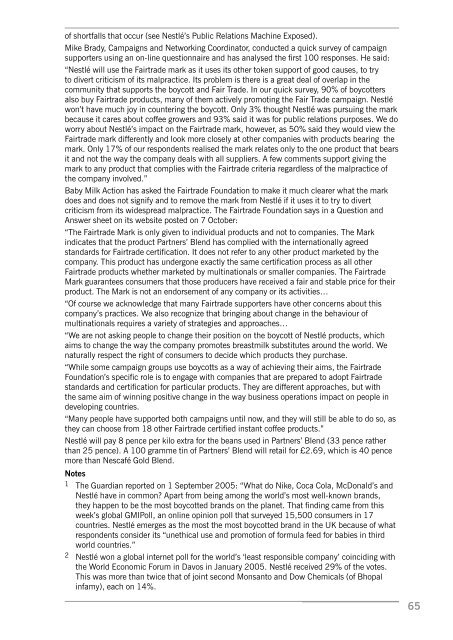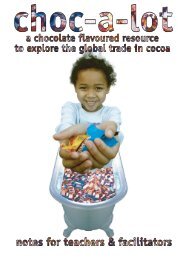Cost of coffee.indd - RISC
Cost of coffee.indd - RISC
Cost of coffee.indd - RISC
You also want an ePaper? Increase the reach of your titles
YUMPU automatically turns print PDFs into web optimized ePapers that Google loves.
<strong>of</strong> shortfalls that occur (see Nestlé’s Public Relations Machine Exposed).<br />
Mike Brady, Campaigns and Networking Coordinator, conducted a quick survey <strong>of</strong> campaign<br />
supporters using an on-line questionnaire and has analysed the first 100 responses. He said:<br />
“Nestlé will use the Fairtrade mark as it uses its other token support <strong>of</strong> good causes, to try<br />
to divert criticism <strong>of</strong> its malpractice. Its problem is there is a great deal <strong>of</strong> overlap in the<br />
community that supports the boycott and Fair Trade. In our quick survey, 90% <strong>of</strong> boycotters<br />
also buy Fairtrade products, many <strong>of</strong> them actively promoting the Fair Trade campaign. Nestlé<br />
won’t have much joy in countering the boycott. Only 3% thought Nestlé was pursuing the mark<br />
because it cares about c<strong>of</strong>fee growers and 93% said it was for public relations purposes. We do<br />
worry about Nestlé’s impact on the Fairtrade mark, however, as 50% said they would view the<br />
Fairtrade mark differently and look more closely at other companies with products bearing the<br />
mark. Only 17% <strong>of</strong> our respondents realised the mark relates only to the one product that bears<br />
it and not the way the company deals with all suppliers. A few comments support giving the<br />
mark to any product that complies with the Fairtrade criteria regardless <strong>of</strong> the malpractice <strong>of</strong><br />
the company involved.”<br />
Baby Milk Action has asked the Fairtrade Foundation to make it much clearer what the mark<br />
does and does not signify and to remove the mark from Nestlé if it uses it to try to divert<br />
criticism from its widespread malpractice. The Fairtrade Foundation says in a Question and<br />
Answer sheet on its website posted on 7 October:<br />
“The Fairtrade Mark is only given to individual products and not to companies. The Mark<br />
indicates that the product Partners’ Blend has complied with the internationally agreed<br />
standards for Fairtrade certification. It does not refer to any other product marketed by the<br />
company. This product has undergone exactly the same certification process as all other<br />
Fairtrade products whether marketed by multinationals or smaller companies. The Fairtrade<br />
Mark guarantees consumers that those producers have received a fair and stable price for their<br />
product. The Mark is not an endorsement <strong>of</strong> any company or its activities…<br />
“Of course we acknowledge that many Fairtrade supporters have other concerns about this<br />
company’s practices. We also recognize that bringing about change in the behaviour <strong>of</strong><br />
multinationals requires a variety <strong>of</strong> strategies and approaches…<br />
“We are not asking people to change their position on the boycott <strong>of</strong> Nestlé products, which<br />
aims to change the way the company promotes breastmilk substitutes around the world. We<br />
naturally respect the right <strong>of</strong> consumers to decide which products they purchase.<br />
“While some campaign groups use boycotts as a way <strong>of</strong> achieving their aims, the Fairtrade<br />
Foundation’s specific role is to engage with companies that are prepared to adopt Fairtrade<br />
standards and certification for particular products. They are different approaches, but with<br />
the same aim <strong>of</strong> winning positive change in the way business operations impact on people in<br />
developing countries.<br />
“Many people have supported both campaigns until now, and they will still be able to do so, as<br />
they can choose from 18 other Fairtrade certified instant c<strong>of</strong>fee products.”<br />
Nestlé will pay 8 pence per kilo extra for the beans used in Partners’ Blend (33 pence rather<br />
than 25 pence). A 100 gramme tin <strong>of</strong> Partners’ Blend will retail for £2.69, which is 40 pence<br />
more than Nescafé Gold Blend.<br />
Notes<br />
1 The Guardian reported on 1 September 2005: “What do Nike, Coca Cola, McDonald’s and<br />
Nestlé have in common? Apart from being among the world’s most well-known brands,<br />
they happen to be the most boycotted brands on the planet. That finding came from this<br />
week’s global GMIPoll, an online opinion poll that surveyed 15,500 consumers in 17<br />
countries. Nestlé emerges as the most the most boycotted brand in the UK because <strong>of</strong> what<br />
respondents consider its “unethical use and promotion <strong>of</strong> formula feed for babies in third<br />
world countries.”<br />
2 Nestlé won a global internet poll for the world’s ‘least responsible company’ coinciding with<br />
the World Economic Forum in Davos in January 2005. Nestlé received 29% <strong>of</strong> the votes.<br />
This was more than twice that <strong>of</strong> joint second Monsanto and Dow Chemicals (<strong>of</strong> Bhopal<br />
infamy), each on 14%.<br />
65




